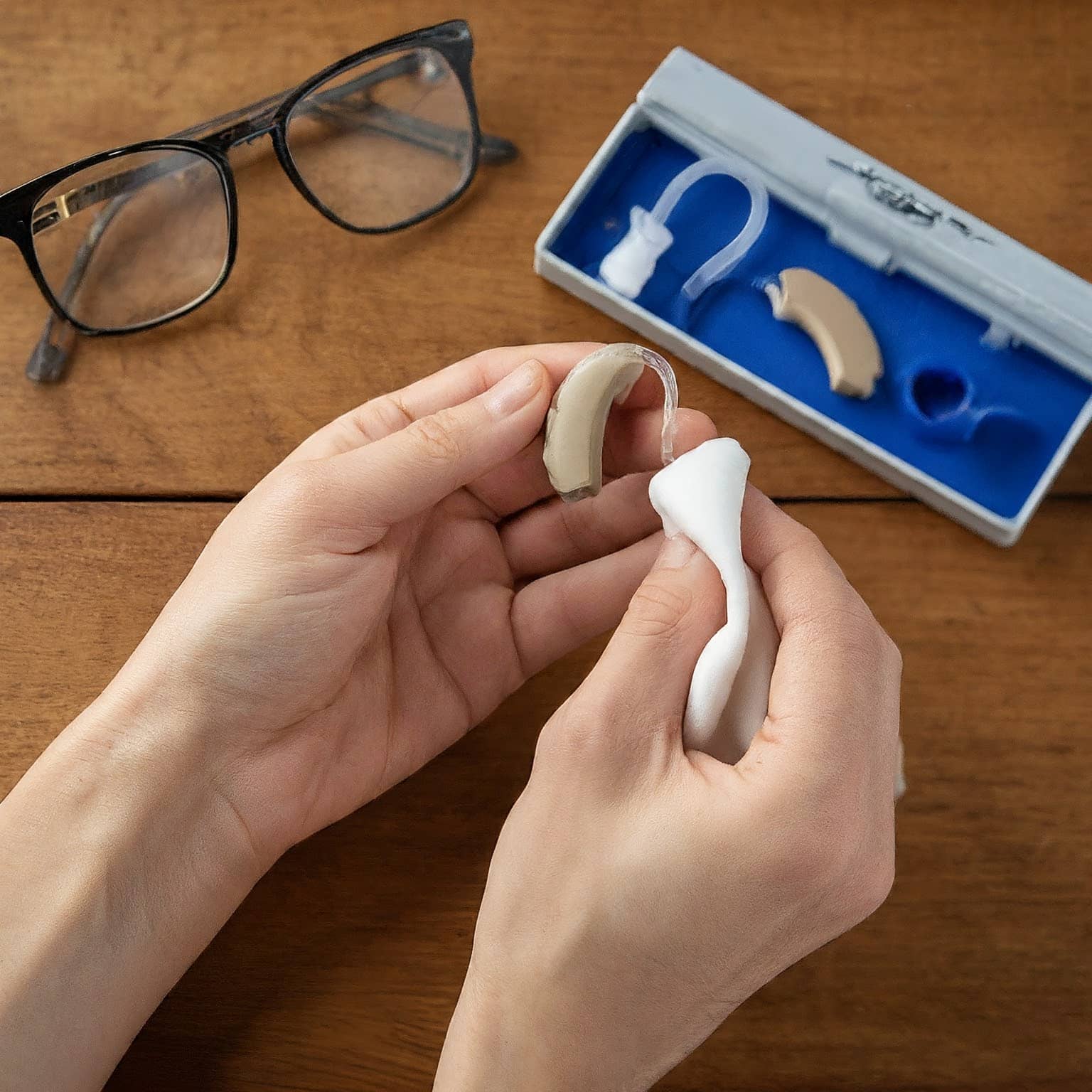
Hearing aids are a vital investment in your quality of life. To ensure they continue performing optimally and last as long as possible, proper care and maintenance are essential. This guide from The Hearing Solution Group covers everything you need to know about hearing aid care.
Daily Hearing Aid Maintenance: Simple Steps for Longevity
Daily care is the cornerstone of ensuring your hearing aids remain in top condition. Just like how we brush our teeth every day, making hearing aid maintenance part of your routine can extend the life of your devices and ensure optimal performance.
Visual Inspection and Cleaning
At the end of the day , take a few minutes to visually inspect your hearing aids for any signs of damage, dirt, or earwax buildup. Pay close attention to the microphone area, receiver openings, and any crevices or grooves where debris can accumulate. If you see any dirt or earwax, use the soft brush or wax filters provided in your hearing aid care kit to gently remove it. Remember, avoid using any liquids or sharp objects that could damage the delicate components.
Wiping Down with a Soft Cloth
In addition to removing visible debris, it’s important to wipe down your hearing aids daily with a soft, dry cloth. This will help remove any oils, perspiration, or other residues that can accumulate throughout the day. Microfibre cloths are ideal for this purpose as they won’t leave behind any lint or fibres. Never use water, cleaning solutions, alcohol, or other harsh chemicals, as these can damage the delicate components of your hearing aids.
Overnight Drying and Storage
Proper storage plays a crucial role in maintaining the longevity of your hearing aids. When you’re not wearing them, store your hearing aids in a cool, dry place, preferably with the battery door open. This allows any moisture inside the battery compartment to evaporate and prevents corrosion. Consider investing in a hearing aid drying kit or dehumidifier for extra protection against moisture damage, especially in humid climates.
Troubleshooting Your Hearing Aids: Common Issues and Solutions
Even with the best care, you might occasionally encounter issues with your hearing aids. Understanding these common problems and their solutions can help you troubleshoot effectively and know when it’s time to consult your audiologist or hearing care consultants.
Feedback (Whistling)
If you hear a high-pitched whistling sound, don’t panic! This is known as feedback and it’s often easily remedied. Feedback typically occurs when amplified sound leaks out of your ear canal and is picked up again by the hearing aid’s microphone. This creates a feedback loop, resulting in the whistling sound. Check for a loose fit of your hearing aid or ear mould, as this is the most frequent cause. A buildup of earwax could also be to blame, so thoroughly clean your ears and the device itself. In some cases, lowering the volume might temporarily resolve the feedback. However, if it persists, contact your audiologist or hearing care consultant, as it could indicate a more complex issue that needs professional attention.
Reduced Sound Quality
If the sound seems muffled, distorted, or weaker than usual, there are several potential causes. First, inspect the microphone and receiver ports for any blockages or obstructions, and clean them gently with the appropriate tools. Make sure your ear moulds or domes are also clean and free of earwax. If your hearing aids have wax filters, check if they need replacing. If these simple checks don’t resolve the issue, it’s best to consult your audiologist or hearing care consultant, as the problem could stem from a technical issue or require adjustments to the hearing aid’s settings.
Discomfort
When you first start wearing hearing aids, a slight feeling of discomfort isn’t unusual as your ears adjust. However, persistent pain or discomfort should never be ignored. It could be a sign that your ear mould doesn’t fit properly, the hearing aid is not positioned correctly, or that there might be an underlying medical issue. If you experience persistent discomfort, contact your audiologist or hearing care consultant promptly. They can assess the fit, make necessary adjustments, or recommend alternative ear mould styles for optimal comfort.
Professional Hearing Aid Maintenance: Tune-Ups for Peak Performance
Just like a car needs regular servicing to keep running smoothly, professional hearing aid fine-tuning is essential for optimal performance and longevity. While your daily cleaning routine is crucial, it’s equally important to schedule professional tune-ups with your audiologist or hearing care consultant from time to time.
Scheduling regular appointments with The Hearing Solution Group is a proactive way to ensure your hearing aids are functioning optimally. During these checkups, our audiologists and hearing care consultants will perform a thorough inspection of your devices, checking for any signs of wear and tear, loose connections, or potential damage.
They’ll also service your hearing aids using specialised techniques, removing debris and wax buildup in hard-to-reach areas that you may not be able to access with your at-home hearing aid care kit. Early detection of any issues can prevent them from escalating into more significant problems, saving you time, money, and frustration in the long run.
Plus, hearing loss can change over time, and your lifestyle and listening environments can also evolve. During your professional maintenance appointments, our audiologists and hearing care consultants will reassess your hearing needs and make adjustments to your hearing aid programming if necessary. This ensures that your devices are always optimised for your current hearing loss and provide the clearest, most comfortable sound possible.
Preventing Hearing Aid Damage: Safeguarding Your Investment
Just a few preventive measures can go a long way in safeguarding your devices from damage and ensuring they continue to provide you with crystal-clear sound:
Keeping Your Hearing Aids Dry
Moisture is a common enemy of hearing aids, as it can corrode the internal components and cause malfunctions. To protect your devices, always remove them before showering, swimming, or participating in any water-related activities. If your hearing aids do get wet accidentally, dry them thoroughly with a soft cloth and use a hearing aid drying kit or dehumidifier to eliminate any lingering moisture.
Avoiding Extreme Temperatures
Extreme temperatures, whether hot or cold, can damage the delicate components of your hearing aids. Never leave your hearing aids in direct sunlight, in a hot car, or near a heater. Similarly, avoid exposing them to freezing temperatures. When storing your hearing aids, choose a cool, dry place away from any heat sources.
Gentle Handling and Safe Storage
Hearing aids are small and intricate devices, so it’s important to handle them with care. Always hold them over a soft surface, such as a carpeted floor or towel, in case they slip from your grasp. When not in use, store your hearing aids in their protective case. This not only prevents them from getting lost but also protects them from accidental bumps and falls.
The Hearing Solution Group’s Comprehensive Hearing Aid Care
Proper hearing aid care ensures you receive the optimal benefit from your investment. By incorporating daily maintenance, seeking professional checkups, and taking precautions against damage, you’ll enjoy clear, comfortable hearing for years to come.
We at The Hearing Solution Group are also committed to ensuring your hearing aids provide years of clear and comfortable hearing. We offer:
- Expert Repairs and Adjustments: If you encounter issues, our experienced audiologists or hearing care consultants can diagnose and repair any problems.
- Replacement Parts and Accessories: We stock a wide range of replacement parts and accessories, including batteries, wax filters, and cleaning supplies.
- Personalised Guidance: We provide individualised advice on the best hearing aid care practices for your specific devices and lifestyle.
Discover our full range of hearing aids in Singapore today.

 Find Us
Find Us Call Us
Call Us
